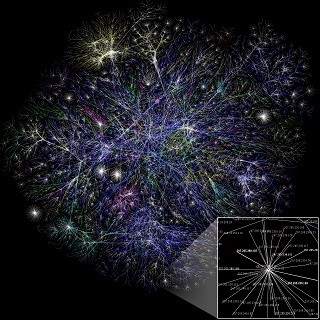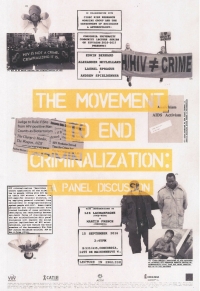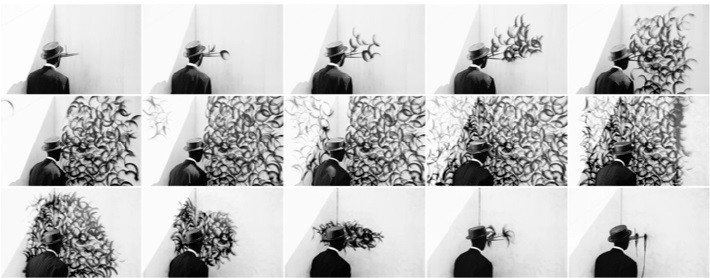Rosemary Collard - Assistant Professor, Geography, Planning & Environment
Rosemary’s central interest is in the relationship between animal life and capitalism. Her curiosity about risk stems from a current research project that investigates the lead-up to and aftermath of environmental disasters, like oil spills, that cause mass animal death. In this time of ecological upheaval, how are human-animal relations and wildlife management regimes reconfigured? Part of the project involves examining how risk and fines are calculated pre- and post-disaster, respectively, especially how animal life and death figure in these calculations, if at all.
|
Valérie de Courville Nicol - Professor, Sociology and Anthropology
Valérie is a sociologist who examines the social processes by which collective fears and desires come into being, with a focus on processes of emotional socialization, forms of emotion management, popular forms of literature on moral and emotional danger, and psychological and other therapeutic discourses and practices pertaining to emotional health. She is interested in what is socially construed as emotional risk, in how emotional risk is collectively experienced, in what affective signs are attached to emotional risk, and in how emotional risk orients individual and collective action through its association with particular capacities and solutions.
|
Mark Doerksen—PhD Candidate, Sociology and Anthropology
Mark’s research examines how perceptions and practises of institutional risk reduction conflict with the cultural practises of individuals. More specifically, he is interested in how medical and related regulations affect engagement with black and grey markets within the body modification scene.
|
Gilbert Émond—Associate Professor, Applied Human Sciences
Gilbert’s research program takes up phenomena of risk in several ways. HIV prevention and homophobia are the central topics, and his basic thinking frameworks are human systems and people interaction, looking for some conciliation of micro actions with macro complex structuration of action and practices. This approach recognizes that, while objective risks may be present in the space where people act, risk taking is not equal for everyone. As an example, a person takes some risk when he climbs mountains, but his training helps him to reduce this level of risk taking. In contrast, for a person with no training, mountain climbing represents a significantly more risky activity than it does for a person with training. However, suppose both climbers are in Nepal or a geologic zone. They, along with all other people in this place, face an objective risk of being affected by an earthquake. How they cope with this risk may be different and depends on a variety of complex factors. This example suggests that objective risks are also relative risks. Risk prevention has to be adapted to the person and the condition of their own experience in the milieu they act in. It is this relativity, and its complex grounds, that interest Gilbert in relation to domains like HIV, homophobia and sexual diversity issues.
|
Martin French—Assistant Professor, Sociology and Anthropology
Martin’s research examines the social dimensions of technology with an empirical focus on communications & information technology and the risks they help to mitigate or aggravate. He is particularly interested in how organizations use surveillance technologies to know and manage the risks they face, and in the potentiality of these technologies to generate unanticipated risks.
|
Alisan Funk—MA Student, INDI Program
Alisan is a Montreal circus coach, performer, creator and director currently pursuing an Independent Master’s degree researching the intersection of Circus and Higher Education. She is a research assistant on multiple projects with the National Circus School examining technical and creative aspects of circus training, as well as pursuing her own research regarding the international trajectories, philosophies and manifestations of circus education.
|
Marilou Gagnon—Associate Professor, Nursing and Director of the Unit for Critical Research in Health, University of Ottawa, Visiting Scholar (2015-2016), Sociology & Anthropology, Concordia University
Marilou’s work is underpinned by critical and sociopolitical approaches. Her fields of study include questions related to the body and technology (including biotechnologies, surveillance technologies and diagnostics), power and discourse, and sociopolitical dimensions of nursing practice and health care more generally. As a member of the University Chair in Forensic Nursing, she has been involved in a number of projects on HIV criminalization, HIV-related stigma, and human rights.
|
Mark Gaspar—PhD Candidate, Centre for Interdisciplinary Studies in Society and Culture
Mark is a Humanities PhD Candidate in CISSC, with a principal focus in sociology. Mark’s work draws on social and cultural theory on risk, as well as the sociology of knowledge, health and illness and sexuality to compare research production on gay men and HIV prevention, with the lived experiences of young HIV negative gay men who have been at risk for HIV. His work examines how these young gay men manage the uncertainties related to HIV prevention, why some gay men manage these uncertainties with more ease than others, and how risk tolerance becomes a core facet of subject formation and self-identity.
|
Fergus Gleeson—MA Student, Sociology and Anthropology
Fergus’s research explores the socio-economic impact of public international law and how it manifests itself in international trade and investment agreements, with a particular emphasis on Investor-State Dispute Settlements. In particular, he focuses on how the accumulation of capital is facilitated by the displacement of risk and responsibility, especially in the realms of finance and ecology. Using the fundamental concepts of systems theory and cybernetics to examine these patterns of regulation and governance, he is interested in furthering interdisciplinary research methods to highlight the techniques used to enable this displacement.
|
Kregg Hetherington—Assistant Professor, Sociology and Anthropology
Kregg is a political anthropologist specialized in environmental conflict, economic regulation, the bureaucratic state and international development in Latin America. He has written about the way that development regimes seek to commodify uncertainty as a way of improving market efficiency, using risk as an idiom for depoliticizing environmental and social conflict. He is interested in the legal and digital infrastructures necessary for making such phenomena calculable in the first place.
|
Lucian Ivanov—MA Student, Sociology and Anthropology
Lucian’s research interests are focused around how individuals managed the created risks caused by surveillance practices in the Eastern European Block. He is interested in gathering and synthesising data under the umbrella of the term surveillance (such as cultural surveillance), data that otherwise is organised and thought of in different terms, in post-communist countries.
|
Jochen Jaeger—Associate Professor, Geography, Planning & Environment
Jochen is a geographer whose research crosses the fields of landscape ecology, road ecology, the quantification and assessment of landscape structure and landscape change, land consumption, ecological monitoring, and environmental impact assessment (EIA). Regarding the topic of risk, he is interested in the disclosure, communication, and consideration of uncertainties (and/or risks) in environmental decision-making and in risk-avoidance behaviour, e.g., in EIA.
|
Sylvia Kairouz—Associate Professor, Sociology and Anthropology
Sylvia is a social psychologist and social epidemiologist whose research focuses on comprehensive multilevel models of determinants of addictive behaviours, dependence and co morbidity, with an emphasis on the creation of (big) data sets that help to assess risk.
|
Ketra Schmitt—Associate Professor with the Centre for Engineering in Society in the Faculty of Engineering and Computer Science
Ketra’s research interest is in risk and policy, particularly as it relates to human and environmental health. She develops simulation models of social-technical systems and cost analysis to investigate both the implications and triggers of regulation. Her current projects involve communicable diseases and vaccine hesitancy, industrial symbiosis and radicalization. |
Marc Lafrance—Assistant Professor, Sociology and Anthropology
Marc is a sociologist whose research explores the phenomena of sex, gender and sexuality as they relate to issues of human identity and embodied experience. Regarding the topic of risk, Marc is currently conducting research on men and masculinity in the context of occupational health and safety while focusing primarily on high risk occupations.
|
Carmen Lamothe—MA Student, Sociology and Anthropology
Carmen’s research interests focus on critical public health and surveillance through mobile technology such as apps. She is interested in exploring how public health agencies use online and other communication technology tools to construct risk, and in turn how the users of these tools use them to attempt to mediate their own risks.
|
Louis Patrick Leroux—Associate Professor, joint-appointment in English and Études françaises
After studies and a career in theatre practice, Patrick became interested in discourse analysis, research-creation and the writing of the body, more specifically in contemporary circus as it has emerged in Québec and can be understood in interdisciplinary perspectives. “Risk” and “Performance” have become two fascinatingly loaded terms in the study of circus, both drawing form high performance sports training and the hybridization of many performing arts forms. Risk has come to be expected and, indeed, spectacularized in this art form. Patrick is the founding director of the Montreal Working Group on Circus Research and is (or recently has been) involved research into the Cirque du Soleil’s impact on Las Vegas and North American cultural industries; the state and conditions of reception of circus research in Québec; and, most recently, circus dramaturgy and creative process at the National Circus School of Montreal, where he is also an Associate Researcher and a guest teacher.
|
Leanne Letourneau—MA Student in Sociology and Anthropology
Leanne’s research examines how the stigma of HIV/AIDS and tuberculosis (TB) is connected to the formation of risk groups, and identification of risky practices, via epidemiology and public health surveillance. She is particularly interested in the Public Health Agency of Canada’s surveillance reports on HIV/AIDS and TB, in the way that risk groups are emphasized in these reports.
|
Andrew Maclean—MA Student, Sociology and Anthropology
Andrew’s research focuses on intersections of individuals, technologies and practice, and specifically on how these transpire in digital spaces. He is currently interested in the emerging risks in online governance reflecting capitalistic imperatives and how these both enable and constrain the emergence of freedoms of speech and expression online.
|
Isabel Macdonald—PhD Candidate, Communication Studies
Isabel’s SSHRC-funded doctoral work seeks to assess the opportunities and challenges of an emergent visual form of humanitarian reportage known as “comics journalism”, in light of the problems scholars have long theorized in more standard visual media representations of people affected by humanitarian crises. As part of her research for her thesis, Picturing life in a camp, she is producing and illustrating an experimental “comics journalism” project drawing on interviews with people displaced by the 2010 earthquake in Haiti. Over the course of the fieldwork she conducted for this project, in a camp for Internally Displaced People (IDPs) in Port-au-Prince, she has become increasingly interested in how agencies appointed to manage populations living in such highly precarious conditions conceive of risk, as well as in the question of what kinds of risk they seek to manage. Her current research is also concerned with the question of how data on migrant populations such as those categorized as IDPs is collected and mobilized in systems of humanitarian governance as well as in media discourses.
|
Alexander McClelland—PhD Candidate, Centre for Interdisciplinary Studies in Society and Culture
Alexander is an academic, writer and activist who is currently working on a doctorate at the Centre for Interdisciplinary Studies in Society and Culture, Concordia University. His work focuses on the intersections of life, law and disease. He has developed a range of collaborative writing, academic, artistic and curatorial projects that cross disciplinary bounds to address issues of criminalization, sexual autonomy, drug liberation, and the construction of knowledge on HIV and AIDS. His doctoral work is examining the lives of people who have been criminally charged and/or prosecuted in relation to not disclosing their HIV-positive status to sex partners in Canada. His work is supported through a range of awards, including the Canadian Institutes of Health Research (CIHR) doctoral HIV/AIDS Community-Based Research Award.
|
Fenwick McKelvey—Assistant Professor, Communication Studies
Fenwick’s research examines Information and Communication Technology Policy with a focus on the pragmatic and policy implications of the computational routines or algorithms embedded in communication media. He is interested in risk relations mediated by new internet routing algorithms and social media platforms. He is also studying computer modeling, simulation and big data as new techniques of govermentality.
|
Eva Monson—Postdoctoral Fellow with the Research Chair on Gambling
Eva’s research background includes exploration of perceived neighborhood disorder and cohesion as they relate to risk of traumatic stress exposure and PTSD. Her current work examines different types of deprivation (e.g., socioeconomic) and their relationships to gambling behavior and related harm.
|
Kris Murray—PhD Candidate, Sociology and Anthropology
Kris’s research involves the voluntary risk taking behaviors of individuals, the political mastication behind their actions and activities, and the ways in which they interact or intersect with commercial, legal, and institutional apparatuses.
|
Jessica Percy-Campbell—MA Student, Sociology and Anthropology
Jessica’s research focuses upon the connections between social media and social justice. Utilizing a cost-benefit analysis of data mining through micro-blogging platforms such as Twitter, she seeks to understand the implications for Sociology and the risks that emerge through the use of public and private spaces online (follow @jessunit on Twitter).
|
Matthew Perks—MA Student, Sociology and Anthropology
Matthew’s research looks into the indexing of environmental behaviours in the Canadian population using the concept of eco-citizenship as a transformative solution in mitigating the risk of climate change. In addition to this, Matthew is interested in the use of Big Data and the concept of gamification as tools of surveillance but also as a tools of empowerment for individuals in the digital space.
|
Norma Rantisi—Professor, Geography, Planning & Environment
Norma Rantisi’s research on cultural industries examines how socio-spatial relations mediates the material and physical risks associated with neoliberalized forms of cultural production today. Some of the fields that she is examining include apparel and circus arts.
|
S.Z. Reuter—Associate Professor, Sociology and Anthropology
Shelley’s most recent research examines the racialized history of Tay-Sachs disease and what recent developments in this era of geneticization and genetic risk have come to mean for human agency. She is also doing work in the area of reproductive decision-making, and is in the beginning stages of new research on the construction of risk in women’s health advice columns.
|
Amy Swiffen—Assistant Professor, Sociology and Anthropology
Amy is a sociologist whose research focuses on the relationship between law and society in new legal contexts, such as human rights, international law and public health law. She is interested in social theories of risk and uncertainty, and how concepts of risk are articulated within sociological theory.
|
Vinicius Teixeira—MA Student, Sociology and Anthropology
Vinicius’ research is inclined to further how the concept of sousveillance can be applied to politically morphing societies. Old paradigms are at stake when independent people start displaying the truth behind the curtains of decision-makers – the associated risks are nearly immeasurable. Having a Latin background allows him to have a quite accurate grasp on societies more susceptible to these transformations and instabilities
|
Matthew Unger—Assistant Professor, Sociology and Anthropology
Matthew is a sociologist who’s work focusses on the intersection of the social, juridical, and political implications within aesthetic judgment. His research also entails understanding the way contemporary discourses, apparatuses and rituals of criminal accusation are informed by contextual and contingent considerations of risk.
|




